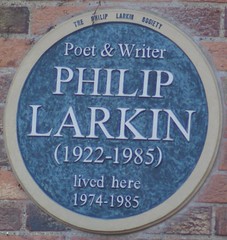Philip Larkin CH CBE FRSL
Philip Larkin CH CBE FRSL
(1922-1985)
poet, Sub-Librarian, Commander of the Most Excellent Order of the British Empire, Fellow of the Royal Society of Literature, and Companion of Honour (from 1985)
partner of Monica Jones
Commemorated on 5 plaques
Philip Larkin 1922-1985 poet Sub-Librarian here 1950-1955
Old Library, Queen's University, Belfast, United Kingdom where they sub-librarian
Poet & writer Philip Larkin (1922 - 1985) lived here 1974 - 1985
105 Newland Park, Hull, United Kingdom where they lived (1974-1985)
We slowed again, And as the tightened brakes took hold, there swelled A sense of falling, like an arrow-shower Sent out of sight, somewhere becoming rain.
King's Cross, London, United Kingdom where they was
1A Ratcliffe Road, Haydon Bridge. Writer Philip Larkin & Monica Jones, his companion of 40 years, shared this secret love nest from 1961 to 1984. "I thought your little house seemed...distinguished and exciting and beautiful...it looks splendid, and it can never be ordinary with the Tyne going by outside...a great English river drifting under your window, brown and muscled with currents!" Philip Larkin April 19xx
1A Ratcliffe Road, Haydon Bridge, United Kingdom where they visited (1961-1984)
I remember, i remember coming up england by a different line for once, early in the cold new year. we stopped, and, watching men with number-plates sprint down the platform to familiar gates, "why, coventry!" i exclaimed. "i was born here". philip larkin poet and coventrian ( 1922 - 1985 )
Platform 1 - Coventry Station, Coventry, United Kingdom where they was





